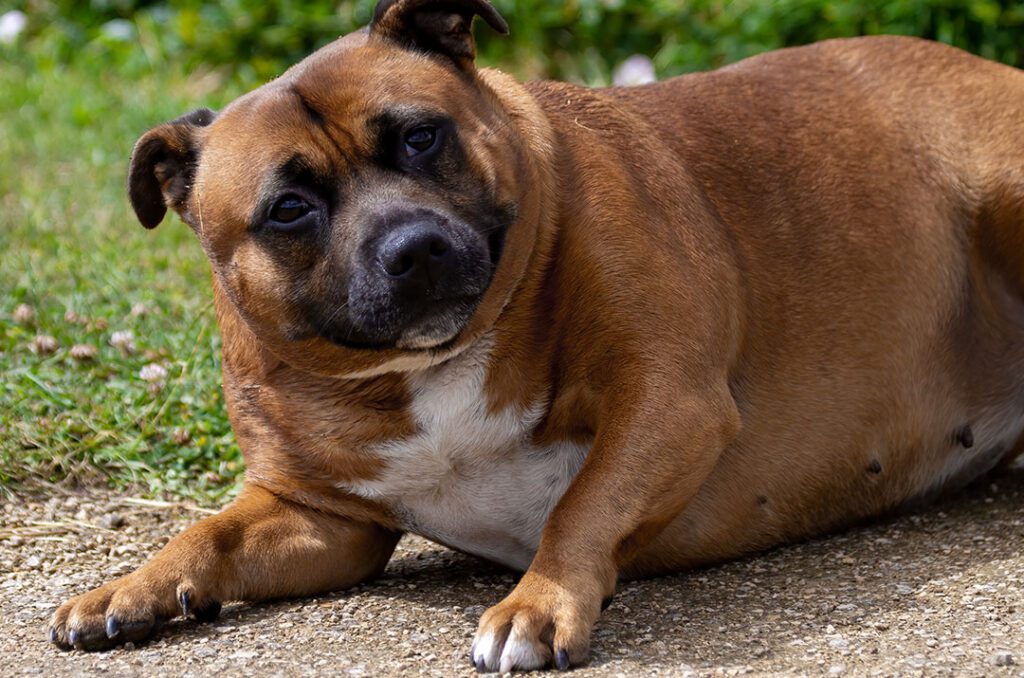
Obesity in dogs is a significant health concern that has been on the rise in recent years. In fact, half of my canine patients are either overweight or obese. Just like humans, dogs can become overweight or obese due to various factors, including overeating, lack of exercise, genetic predisposition, and certain medical conditions. Obesity can lead to a range of health issues in dogs, such as joint problems, heart disease, diabetes, respiratory issues, and a reduced lifespan. Preventing and treating obesity in dogs is essential for ensuring their overall health and well-being.
Obesity in dogs can lead to various health issues and diseases, just like in humans. Here is a list of some common diseases and health problems that can result from obesity in dogs:
- Diabetes Mellitus: Obesity can increase insulin resistance, leading to diabetes, a condition where the body’s ability to regulate blood sugar is impaired.
- Osteoarthritis: Excess weight puts additional strain on the joints, leading to the development or exacerbation of osteoarthritis, a painful condition affecting the joints.
- Cardiovascular Disease: Obesity is associated with an increased risk of heart disease and hypertension (high blood pressure) in dogs.
- Respiratory Problems: Overweight dogs may experience difficulty breathing and are at a higher risk of developing respiratory issues, particularly during physical activity.
- Heat Intolerance: Obese dogs have a reduced ability to dissipate heat, making them more susceptible to heatstroke and heat-related illnesses.
- Skin and Coat Issues: Obese dogs may have difficulty grooming themselves properly, leading to skin infections and coat problems.
- Digestive Disorders: Obesity can contribute to gastrointestinal issues, including pancreatitis and gastroesophageal reflux disease (GERD).
- Urinary Tract Problems: Obese dogs may be at a higher risk of developing urinary tract infections and urinary incontinence.
- Liver Disease: Obesity can lead to an accumulation of fat in the liver, potentially resulting in hepatic lipidosis or fatty liver disease.
- Cancer: Some studies suggest that obesity may increase the risk of certain types of cancer in dogs.
- Immune System Compromise: Obesity can weaken the immune system, making dogs more susceptible to infections and diseases.
- Reproductive Problems: Obese female dogs may face difficulties during pregnancy and whelping, and obese male dogs may experience reduced fertility.
It’s essential to recognize that obesity is a multifactorial condition, and not all dogs will experience the same health issues. However, addressing and managing obesity can significantly reduce the risk of these associated diseases and improve the overall health and well-being of your canine companion. Regular veterinary check-ups, a balanced diet, appropriate exercise, and maintaining a healthy weight can help prevent or manage these obesity-related health problems in dogs.
Prevention:
- Balanced Diet: Feed your dog a well-balanced and appropriate diet according to their age, size, and activity level. Avoid excessive treats and table scraps, as they can contribute to weight gain.
- Portion Control: Measure your dog’s food to avoid overfeeding. Follow the feeding guidelines on the dog food package I recommend feeding on the low end of the weight range given on food bags.
- Regular Exercise: Ensure your dog gets regular exercise to burn calories and maintain a healthy weight. Daily walks, playtime, and interactive activities can help keep them physically active.
- Avoid Free Feeding: Instead of leaving food out all the time, establish scheduled feeding times to control their intake and prevent overeating.
- Limit Treats: Use healthy, low-calorie treats sparingly and avoid giving them as a substitute for love or attention. Appropriate treat size should be small enough to fit between your thumb and forefinger, literally a pinch. Yes, that’s tiny, and kind of the point .
Treatment:
- Consult a Veterinarian: If you suspect your dog is overweight or obese, consult with a veterinarian to assess their overall health and create a personalized weight loss plan. Telemedicine is perfect for this, as diet is typically one of the last things discussed, if it’s discussed at all in an office visit.
- Dietary Changes: I can make recommendations about switching to a weight management dog food that is lower in calories and fat. Prescription weight loss diets are also available for more severe cases.
- Portion Control: Measure your dog’s food accurately and divide it into multiple small meals throughout the day to control their calorie intake.
- Regular Exercise Routine: I can help you establish a safe and effective exercise routine tailored to your dog’s capabilities and health status.
- Weight Monitoring: Regularly weigh your dog to track their progress and make necessary adjustments to the weight loss plan.
- Behavioral Changes: Address any behavioral issues that might contribute to overeating, such as boredom, anxiety, or attention-seeking behavior.
- Avoid Crash Diets: Rapid weight loss can be harmful to a dog’s health. Gradual, steady weight loss is safer and more sustainable.
- Considerations for Older Dogs: If your dog is older or has underlying health issues, extra care is required during the weight loss process. Your vet can guide you accordingly.
Remember that every dog is unique, and weight management plans should be tailored to their specific needs. Patience and consistency are key to successful weight loss and maintenance. Regular veterinary check-ups will help monitor progress and ensure your dog’s weight loss journey is on the right track. By preventing and treating obesity, you can significantly improve your dog’s quality of life and extend their lifespan.

